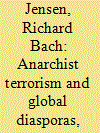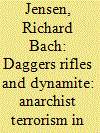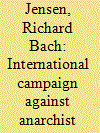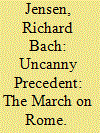|
|
|
Sort Order |
|
|
|
Items / Page
|
|
|
|
|
|
|
| Srl | Item |
| 1 |
ID:
163203


|
|
|
|
|
| Summary/Abstract |
The little-known assassination in 1904 of governor general Bobrikov, the Russian ruler of Finland, by the Finnish Senate clerk Eugen Schauman can be explained as an act of tyrannicide, anarchism, or terrorism. The article analyzes the question of which category this deed fits into and discusses the local and international background of one of the most significant acts of violence in Nordic history. It also postulates that around the time of Bobrikov’s murder in 1904 a fundamental shift occurred in the usage of the term “terrorism,” which began to replace “anarchism” as the standard signifier for violent crimes against civilization as well as against specific political grievances and institutions.
|
|
|
|
|
|
|
|
|
|
|
|
|
|
|
|
| 2 |
ID:
139995


|
|
|
|
|
| Summary/Abstract |
During the quarter century before the First World War, anarchist terrorism was often blamed on the impact of anarchist agitators on naïve immigrants. This article seeks to investigate the truth of this claim, focusing particularly on Italian emigrants, but also looking at some examples of Spanish, French, and Russian emigrants. My conclusion is that, with a few exceptions, radicals emigrated, but emigration did not create radical terrorists. A particularly good example of this can be found by examining the large Italian emigration to Argentina. At most, the emigrant experience may have heightened a pre-existing radicalism or given more precise configuration to its violent expression.
|
|
|
|
|
|
|
|
|
|
|
|
|
|
|
|
| 3 |
ID:
053346


|
|
|
| 4 |
ID:
087355


|
|
|
|
|
| Publication |
2009.
|
| Summary/Abstract |
This essay presents a short overview of the "classic" era of anarchist terrorism between 1880 and World War I, while concentrating on an analysis of the little-known efforts by diplomats, politicians, and the police to control and repress anarchist terrorism. These efforts included the Rome Anti-Anarchist Conference of 1898 and the St. Petersburg Protocol of 1904. Before World War I, a combination of economic, social, and political factors, combined with a systematic government effort to redefine and downplay the nature and importance of anarchist terrorism provides the best explanation for why this form of violence declined in certain countries but not in others. Careful police intelligence work and international police cooperation, together with a more rigorously professional system of protection for monarchs and heads of state, could aid in reducing the problem of anarchist terrorism, but heavy-handed repression only worsened it. The essay concludes with a sketch of anarchist terrorism after 1914 and a brief comparison between present-day terrorism and its nineteenth-century predecessor.
|
|
|
|
|
|
|
|
|
|
|
|
|
|
|
|
| 5 |
ID:
132364


|
|
|
|
|
| Publication |
2014.
|
| Summary/Abstract |
After discussing the extent to which the period from 1878-1934, with its frequent incidents of anarchist assassinations and bombings, can be considered the classic age of "lone wolf" or leaderless terrorism, this article focuses on four acts of anarchist violence and police and government responses to this violence. The four cases are the 1896 bombing of a Corpus Christi procession in Barcelona, the 1901 assassination of President McKinley, a 1902 bombing in Livorno (Leghorn) Italy, and the 1912 attempted assassination of Italian King Victor Emmanuel III. Confronted by these violent acts, the authorities resorted to two basic policies that might be referred to as "micro" and "macro" approaches. The macro approach was to launch massive crackdowns, arrest hundreds if not thousands of suspects (in some cases torturing them), and pass repressive legislation limiting freedom of the press, freedom of association, and freedom of assembly in order to discover the guilty terrorists and to squelch anarchist propaganda and organized activity. The micro approach was to focus on improving the intelligence capacity of the police by modernizing and expanding it, and creating or professionalizing the protective service for government ministers and heads of state.
|
|
|
|
|
|
|
|
|
|
|
|
|
|
|
|
| 6 |
ID:
156902


|
|
|
|
|
| Summary/Abstract |
An unprecedented expansion of global anti-terrorist policing took place after 1900, although the security forces projected outside their borders by Russia, Italy, Germany, Austria-Hungary, Spain, and Argentina displayed an enormous diversity in size and effectiveness. Crucial to successful policing was how these countries improved their intelligence through recruiting and handling informers, maintained secrecy and good relations with local police, and handled the media. The British approach to anarchist control was arguably the most successful. Italian international policing was the most far-reaching, while the United States long remained the world's most under-policed large country. On examination, the view that anti-anarchist policing was a case of conservative imperial regimes versus the Western democracies loses validity. During this period, a general trend saw the transfer of anarchist surveillance from the hands of diplomats into those of interior ministry officials and the police, all in the name of greater centralization, professionalization, and efficiency.
|
|
|
|
|
|
|
|
|
|
|
|
|
|
|
|
| 7 |
ID:
182993


|
|
|
|
|
| Summary/Abstract |
Trump supporters’ assault on the U.S. Capitol on January 6, 2021, finds an intriguing precedent in Mussolini’s March on Rome in October 1922. This article explores the similarities and differences between the two events and the two leaders and seeks to answer the question of why one was a failure and the other a success.
|
|
|
|
|
|
|
|
|
|
|
|
|
|
|
|
|
|
|
|
|